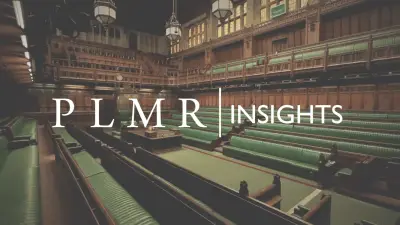As the UK wakes up from its Christmas slumber, the events of the past month already seem somewhat distant, but no less remarkable. After a year dominated by Brexit uncertainty and ongoing deliberation, it was only right the UK’s imminent departure from the EU took centre-stage in December as well.
The culmination of a tumultuous year was complete with high drama in Westminster as Number 10, at the last minute, decided to postpone the ‘meaningful vote’ on the exit agreement, in the knowledge that the government would be heavily defeated. Concern among both Remain and Leave MPs at the UK being tied indefinitely into a customs union via the Irish backstop became too strong for May to risk a vote.
Spearheaded by Owen Paterson MP, the decision to pull the vote proved the tipping point for a number of Conservative MPs to put their letters into the 1922 Committee, resulting in a vote of confidence in the PM having to be held. Much to the chagrin of the malcontents in her own party, the confidence vote was arranged and held by the 1922 Committee quickly, leaving Eurosceptic opponents little time to present a viable alternative. May won the vote by 200 to 117; a substantial victory, but certainly not a landslide. However, it does mean that she cannot be challenged by her own party for a further 12 months, leaving leading critics such as Jacob Rees Mogg in an awkward situation.
Whilst this ultimately meant Westminster was in the same situation as it had been before – with a PM unable to extract further concessions from the EU and unable to push through her deal – the holding of the vote did result in May seemingly agreeing not to lead the party into the next election. We are already beginning to see the impact of this as contenders for the top job begin to jostle for position. For example, Sajid Javid’s handling of the migrant crisis over Christmas has come under intense scrutiny as briefings both in favour and against him have made their way into the press. It is noticeable how quiet Boris has been during this period – possibly keeping his powder dry…
Pleasingly, the end of the year also contained a bit of ‘politics as usual’ as a number of important white papers, strategies and consultations were announced. Most notably, and controversially, the government’s Immigration White Paper was finally published, setting out plans for a post-Brexit immigration system. The plans, which focus on levelling the playing field between EU and non-EU immigration and restricting low-skilled immigration in favour of those with higher-skills (through the introduction of a £30,000 salary threshold), would represent a big departure for the UK’s labour market and for businesses, who have relied on accessing low-skilled labour from the EU in recent years. This is a debate which we can expect to rumble on, and which goes to the heart of what a post-Brexit Britain is to look like.
Furthermore, the government has continued its focus on environmental issues with the publication of the latest Resources and Waste Strategy, containing a number of measures to reduce waste and plastic usage. The most eye-catching of these are a furthering of the ‘polluter pays’ principle on manufacturers; ambitions to introduce a deposit return scheme to introduce recycling of single-use drinks containers; and the introduction of annual food surplus and waste reporting by food businesses.
In a nod to attempt to show they are also tackling the issues of the day, the government has also made other announcements. These include the independent Williams Rail Review beginning work, via a consultation, looking at how the UK’s rail system can be reformed to improve our network and services across the country. Over Christmas the £675 million Future High Streets Fund was opened to local bids to transform local high streets. The future of the high street is rapidly rising up the political agenda and as an issue that impacts the majority of population, it is one policymakers at MHCLG are increasingly alive to.
With Parliament reconvening on the 7th January, the political focus will once again return to the imminent issue of whether a Brexit deal can be agreed by Parliament or not. A new date for the ‘meaningful vote’ has tentatively been scheduled for the week beginning 14th January, though reports are leaking out that Number 10 still thinks it will lose any vote and may push the date further back. Should the government lose any vote, it would be up to the opposition parties to decide whether to hold a confidence vote in the government – it remains unclear whether there would be a majority in the House for this. 2019: it’s likely to be more of the same.





